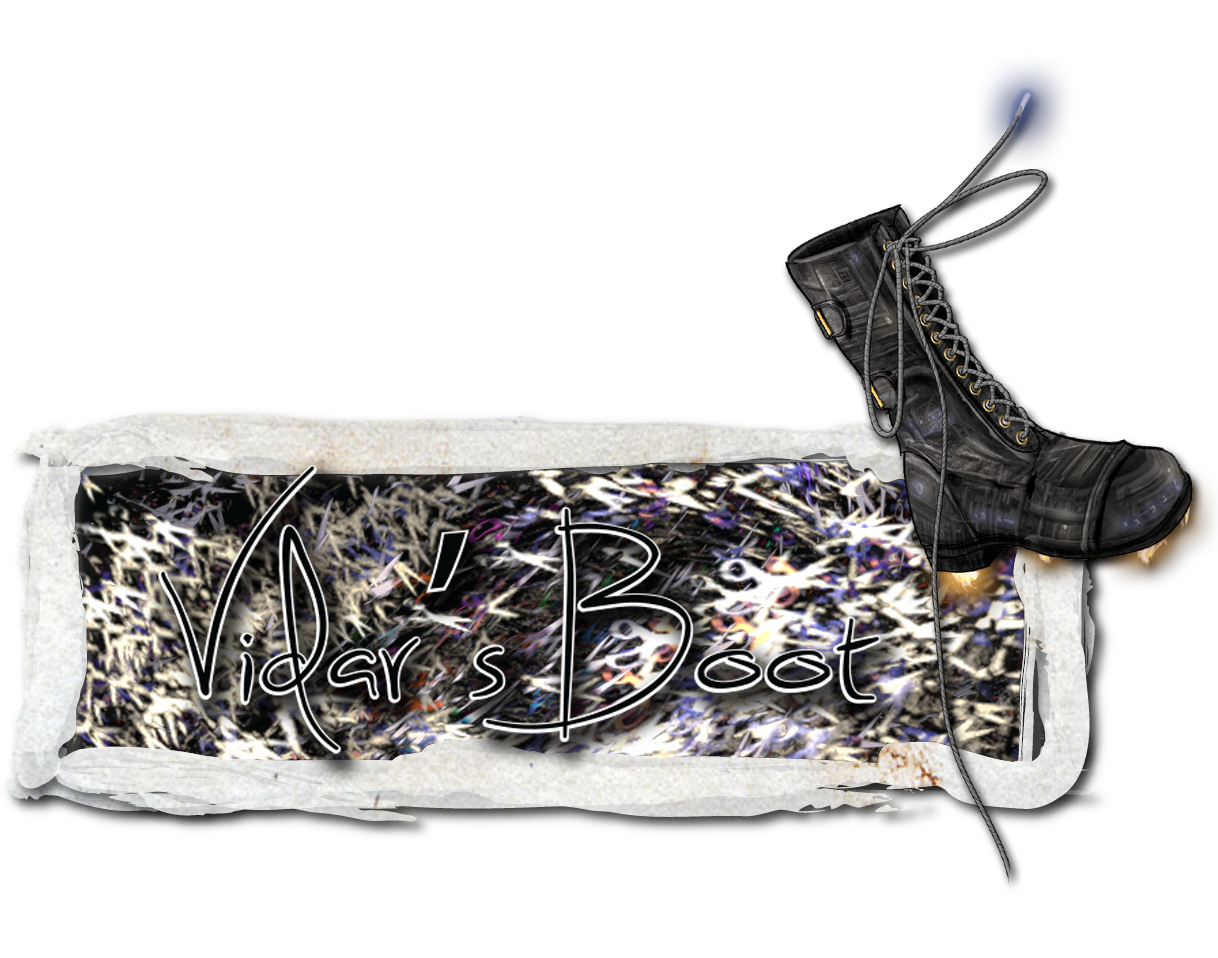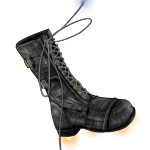– 1 –
For nine days and nine nights, Cheryl hangs herself upside down in the stacks of the Lethal Magnet School of Wayward Youth library in search of wisdom. She clings perilously to a rappelling rope over the maw of the library’s basement beast.
It flaps its pages at her. It growls prophecies. These she consciously struggles to ignore.
She pulls out dusty records. She gets dust in her right eye. It’s really rather unpleasant.
She gets a stitch in her left side.
She reads pages, upside down.
It’s worth it, though. It, and all those courses in library science — for all that they’d barely touched upon the subject of rappelling or of the beast.
She’s found something. She’s spotted something. She’s followed up on it, at first, mostly because she thought it might give her an angle on the wolf and Edmund; but when she’s traced it back to the circumstances behind it there’s something so much better than that at the end.
She drags herself up.
She tumbles to the catwalk, rolls, stands, sways, falls over, and there in the library she goes to sleep.
The next day, she has a migraine. She babbles useless if prophetic information in her Electronics Class and attempts to teach her Prophesy teacher about circuit diagrams.
“I knew if I came here and taught Prophesy,” the Lethal Magnet Professor of Prophesy sighs, “that I would eventually understand circuit diagrams, and to my doom.”
Cheryl blinks wearily at the Lethal Magnet Professor of Prophesy, shakes her head, and wanders off.
The day after that, though, she is crisp. She is clear-headed. She aches all over but she has not lost too much time. She goes to jail. She argues with the guards. Eventually she demonstrates a peculiar folding technique that traps them in their own minds so that she may sneak into the prison and stand outside the svart-elf Joffun’s cell.
He looks up at her.
“Bout time someone came,” he says. “Stupid humans.”
The floor and walls of his cell are covered with tic-tac-toe diagrams scraped carefully into the stone. She assumes he’s been using them for magic. The alternative is too pathetic to imagine.
“You’re from the olden days,” she says. “You’re a svart-elf.”
“I’m from my own days,” he says. “And it’s a bum rap anyway. You gonna let me out of here?”
“You know how to handle,” she says. She waves vaguely towards the wall. “Cannibals, and wolves, and serpents, and stuff.”
“Yeah,” he says.
She sits down cross-legged in front of his cell. “Tell me.”
He shrugs. He turns away. Then he says, “Tic-tac-toe,” he says.
“I don’t have time to scrape one out —”
He waves a hand. “I’ve got most of the partial games already written down somewhere,” he says.
“Oh,” she says.
She scans the walls. Eventually she points at a 9-square board that only has a single X.
“I win,” he says. “Go away.”
She squints at him.
He points at a game that O has won. “Check and mate,” he says.
“That is the worst thing I have ever heard,” she tells him.
“I have been locked up for more’n twelve years,” Joffun says, “because I carried out a deal, fairly, with a giant of industry.”
“Wow,” says Cheryl, who’s only barely been alive that long.
“I put footfalls on that man’s cat,” Joffun says. “You know. Good footfalls. And I’d have thrown in some solid bird-spittling, too, if he’d just asked. But does the judge care at my trial? Does he appreciate it for a moment? No! It’s all about who has more money, around here.”
“Wow,” says Cheryl, again.
Then she shakes it off, because his tic-tac-toe offends her. She grins. She comes up with a nasty comment. Her grin, reflexively, widens. “I guess you svart-elves must find false imprisonment pretty ethically offensive, huh?”
“. . . Don’t be on me about that,” he says. “I’m not hardly any Hans. I’m just a smith.”
“You’re here because the world’s not fair,” Cheryl says. “That’s all. But you’ll die with the rest of us when the serpent comes. When the wolf gets loose. When the scissors fall.”
“I’ve got walls of stone about me,” he says.
He points at a different tic-tac-toe board. “Checkmate,” he says again.
She shrugs. She points at a winning board for X.
“I can’t see where you’re pointing,” he says. “I’m not facing you.”
“I can’t let you go,” she says. “Everyone knows your kind is tricky.”
“My kind?”
“Well,” she says. “In fairy tales and such.”
He turns. He looks at her.
“They took my tools,” he says. “They took my booze. But most of all, they took back that boy’s heart I’d bought, and I’d just gone and dumped all my power in. It’s damn hard to get power back, you know, when all you’ve got is a jail cell and some tic-tac-toe. I’m not myself, girl. Not for twelve long years.”
He shows a bit of avarice. He shows a bit of a smile.
“You’ll get it back for me, though, won’t you? Get it and I’ll tell you everything. Get it and I’ll help you, girl. I’ll fight beside you. We’ll get this sorted. Just get me that damn boy’s heart.”
She hesitates.
Then she smiles. “I’m sorry,” she says.
She rises.
“Pardon?”
“I want to dream,” she says. “That’s all. To create things, to fold things, to do science, and to build a better world. I want to bring a higher level of organization to this mortal world. I thought you’d want the same thing, being a svart and all. But if all you want is some boy’s heart, I have to leave you here and forget about you, because then I just don’t think that you’re all that.”
She smiles at him.
He lunges to the bars. He reaches for her. His eyes flare gold; they loom over her; they are larger than the world, they are like the sun, but the light falls into the blackness of her own eyes and it is lost.
She gets to her feet.
“Wait,” he says.
“I’ll play you a real game,” she says. “I’ll show you how tic-tac-toe is really played. And then you’ll tell me everything. And then I’ll leave you here, because I’m insulted, do you understand me? I’m insulted that someone like you would even claim to be a smith.”
“Fine,” he says. He points at the wall.
“A real game,” she says.
She reaches into her purse. She pulls out a gun. He startles back. She unfolds the gun into an irregular piece of paper, a pen, and a flight of origami swans that scatter out upon the prison floor. She folds the paper, roughly, into a square. She marks it with six lines. She adds an X.
“First move’s an unfair advantage,” he says.
She shrugs. She folds the paper over, once, twice, thrice, until a pristine configuration emerges. She draws new lines. She only needs four of them, since two of the previous lines were left over. She hands him the pen and the paper. He marks an X.
She marks an O.
X. O. X. O. X.
“Well, there,” says Joffun, smugly.
“Hold the paper,” she says. “And the pen. Close your eyes.”
“Huh?” he says.
But he does it.
There is the sound of paper. He opens his eyes. He is holding a winning game for O.
“We’re done here,” she says.
He tries to unfold the paper back into the original game. He pulls up the central part like a flower. He folds it over to the edges. It is another winning game for O. He frowns. He flips it over. He twists it.
“‘A strange game,’” Cheryl quotes.
“Don’t say it,” pleads Joffun. “Please don’t say it.”
He doesn’t want her to finish off that quote on tic-tac-toe with ‘the only winning move is not to play.’
Her lips pinch in amusement. Then she shrugs. She turns away.
“I’ll tell you,” says Joffun. “I’ll tell you all I know. Listen. The wolf needs a boot to kill it. If it gets out of the chains. It needs a really big boot to kill it. Who can stomp it? I don’t know. Cannibals — whatever. Shoot them? Maybe a death ray? You can teach birds to drool if you practice hard —”
“The snake,” she interrupts.
“What?”
“The giant paper snake,” she says. “Why can’t I kill it?”
He shrugs.
“You’re probably just too attached to it,” he says.
She squints at him.
She turns away. She makes an angry, dismissive gesture. She starts walking.
“Where did you learn to play tic-tac-toe, girl?” he yells after her. “What are you?”
She stops.
She hesitates, though she doesn’t look back.
“I’ll let you go,” she says. “I’ll go back on my word and I’ll let you go. I’ll forget the pride I have in being someone who makes things and builds things and someone who does rightful things, and I’ll let you go, and I’ll let you keep on pretending to be a smith, and I’ll even let you go and try to steal that monster’s heart, if you’ll tell me how to save people from their own stupidity.”
He sits back down on the cot in his cell.
He stares at her back.
“My friend,” she says. “He wears a hat, and he is very brilliant, and he fights to wake the dead and empty Hell and give us all a purpose and a happy ending, but I do not think that he likes what he has become.”
“You can save people from their own stupidity,” Joffun says, “by smartenin’ em.”
He licks his lips.
“But I think,” he says, “that what you mean to ask is, how do you save people from their own mistakes?”
“. . . yes,” she says, softly.
“Can’t be done,” says Joffun. “That’s why we call ’em people.”
Her back is stiff. She does not turn. She walks out, and her feet click on the stones.
He sits back.
He thinks, for a very long time.
You’d think he’d be angry that she left him there. He’d think he’d be angry that she left him there. But he isn’t.
He’s too impressed.
He hadn’t even known somebody could be better than a svart like him at the noble game of tic-tac-toe.


